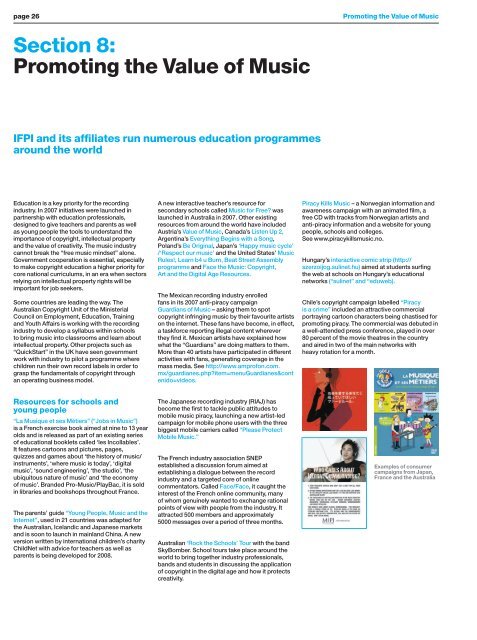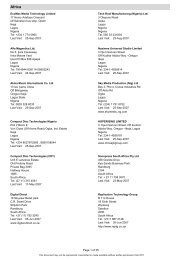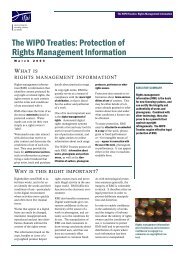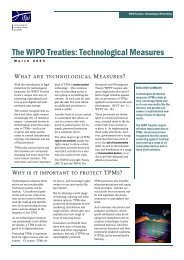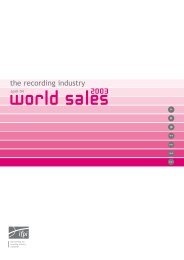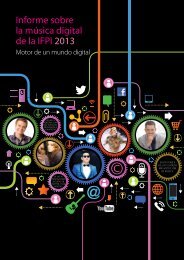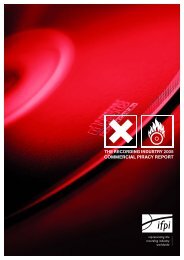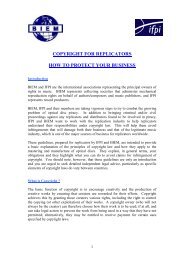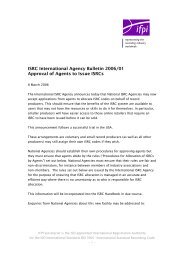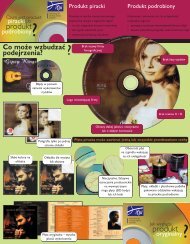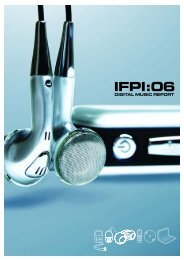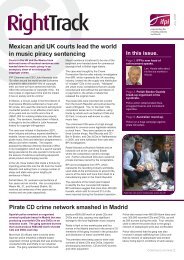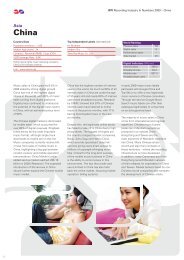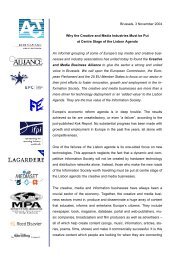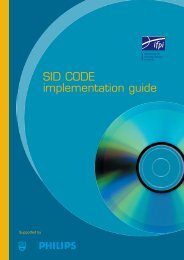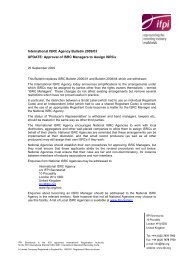Create successful ePaper yourself
Turn your PDF publications into a flip-book with our unique Google optimized e-Paper software.
page 26<br />
Section 8:<br />
Promoting the Value of Music<br />
<strong>IFPI</strong> and its affiliates run numerous education programmes<br />
around the world<br />
Education is a key priority for the recording<br />
industry. In 2007 initiatives were launched in<br />
partnership with education professionals,<br />
designed to give teachers and parents as well<br />
as young people the tools to understand the<br />
importance of copyright, intellectual property<br />
and the value of creativity. The music industry<br />
cannot break the “free music mindset” alone.<br />
Government cooperation is essential, especially<br />
to make copyright education a higher priority for<br />
core national curriculums, in an era when sectors<br />
relying on intellectual property rights will be<br />
important for job seekers.<br />
Some countries are leading the way. The<br />
Australian Copyright Unit of the Ministerial<br />
Council on Employment, Education, Training<br />
and Youth Affairs is working with the recording<br />
industry to develop a syllabus within schools<br />
to bring music into classrooms and learn about<br />
intellectual property. Other projects such as<br />
“QuickStart” in the UK have seen government<br />
work with industry to pilot a programme where<br />
children run their own record labels in order to<br />
grasp the fundamentals of copyright through<br />
an operating business model.<br />
Resources for schools and<br />
young people<br />
“La Musique et ses Métiers” (“Jobs in Music”)<br />
is a French exercise book aimed at nine to 13 year<br />
olds and is released as part of an existing series<br />
of educational booklets called ‘les Incollables’.<br />
It features cartoons and pictures, pages,<br />
quizzes and games about ‘the history of music/<br />
instruments’, ‘where music is today’, ‘digital<br />
music’, ‘sound engineering’, ‘the studio’, ‘the<br />
ubiquitous nature of music’ and ‘the economy<br />
of music’. Branded Pro-Music/PlayBac, it is sold<br />
in libraries and bookshops throughout France.<br />
The parents’ guide “Young People, Music and the<br />
Internet”, used in 21 countries was adapted for<br />
the Australian, Icelandic and Japanese markets<br />
and is soon to launch in mainland China. A new<br />
version written by international children’s charity<br />
ChildNet with advice for teachers as well as<br />
parents is being developed for <strong>2008</strong>.<br />
A new interactive teacher’s resource for<br />
secondary schools called Music for Free? was<br />
launched in Australia in 2007. Other existing<br />
resources from around the world have included<br />
Austria’s Value of Music, Canada’s Listen Up 2,<br />
Argentina’s Everything Begins with a Song,<br />
Poland’s Be Original, Japan’s ‘Happy music cycle’<br />
/‘Respect our music’ and the United States’ Music<br />
Rules!, Learn b4 u Burn, Beat Street Assembly<br />
programme and Face the Music: Copyright,<br />
Art and the Digital Age Resources.<br />
The Mexican recording industry enrolled<br />
fans in its 2007 anti-piracy campaign<br />
Guardians of Music – asking them to spot<br />
copyright infringing music by their favourite artists<br />
on the internet. These fans have become, in effect,<br />
a taskforce reporting illegal content wherever<br />
they find it. Mexican artists have explained how<br />
what the “Guardians” are doing matters to them.<br />
More than 40 artists have participated in different<br />
activities with fans, generating coverage in the<br />
mass media. See http://www.amprofon.com.<br />
mx/guardianes.php?item=menuGuardianes&cont<br />
enido=videos.<br />
The Japanese recording industry (RIAJ) has<br />
become the first to tackle public attitudes to<br />
mobile music piracy, launching a new artist-led<br />
campaign for mobile phone users with the three<br />
biggest mobile carriers called “Please Protect<br />
Mobile Music.”<br />
The French industry association SNEP<br />
established a discussion forum aimed at<br />
establishing a dialogue between the record<br />
industry and a targeted core of online<br />
commentators. Called Face/Face, it caught the<br />
interest of the French online community, many<br />
of whom genuinely wanted to exchange rational<br />
points of view with people from the industry. It<br />
attracted 500 members and approximately<br />
5000 messages over a period of three months.<br />
Australian ‘Rock the Schools’ Tour with the band<br />
SkyBomber. School tours take place around the<br />
world to bring together industry professionals,<br />
bands and students in discussing the application<br />
of copyright in the digital age and how it protects<br />
creativity.<br />
Promoting the Value of Music<br />
Piracy Kills Music – a Norwegian information and<br />
awareness campaign with an animated film, a<br />
free CD with tracks from Norwegian artists and<br />
anti-piracy information and a website for young<br />
people, schools and colleges.<br />
See www.piracykillsmusic.no.<br />
Hungary’s interactive comic strip (http://<br />
szerzoijog.sulinet.hu) aimed at students surfing<br />
the web at schools on Hungary’s educational<br />
networks (“sulinet” and “eduweb).<br />
Chile’s copyright campaign labelled “Piracy<br />
is a crime” included an attractive commercial<br />
portraying cartoon characters being chastised for<br />
promoting piracy. The commercial was debuted in<br />
a well-attended press conference, played in over<br />
80 percent of the movie theatres in the country<br />
and aired in two of the main networks with<br />
heavy rotation for a month.<br />
Examples of consumer<br />
campaigns from Japan,<br />
France and the Australia


